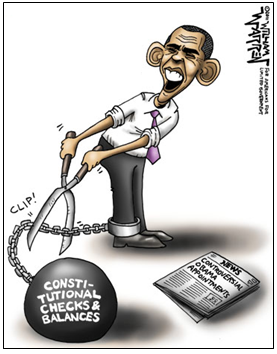A version of this article appeared on WashingtonExaminer.com.
President Obama’s January 2012 decision to unilaterally declare the Senate in recess and install three Members to the National Labor Relations Board stands as one of the most egregious usurpations of power in our history.
Using a purported power under the Constitution’s recess appointment clause, the President steamrolled the constitutional advice and consent process, seizing away the Senate’s confirmation duties.
The legality of the Obama appointments, and the more than 200-year-old Senate confirmation check will be tested as the Supreme Court recently announced that they will review the NLRB v. Noel Canning case, which challenges these appointments.
The consequences that this case has for our system of limited government with its constitutionally mandated checks and balances cannot be overstated. If the President is allowed to bypass the Senate and unilaterally install appointees, a key limit on the power of the presidency will be lost and the center of gravity for federal power will move even further toward the Executive Branch and away from Congress and the people.
If the Court fails to uphold Canning, there will no longer be a limit on the President’s recess appointment powers effectively rendering the entire principle of Senate confirmation meaningless. The recess exception then swallows the rule, allowing the President to make appointments whenever he deems the Senate is “unavailable,” such as during lunch, over the weekend, or perhaps after hours on a Thursday. Little if any incentive will exist for the President to submit nominees to the Senate. He will simply install them by his own command.
Eviscerating the confirmation check on the President’s appointment power is also likely to affect the type of appointees that the President chooses. It is exactly because the President is required to work with the Senate to confirm his nominees, he is forced, to submit nominees that are likely to be confirmed.
Consider Tom Perez, Obama’s nominee for U.S. Secretary of Labor. Due to his radical past and views, the Senate is currently carefully reviewing his record and has delayed his confirmation vote. If the President can unilaterally install Perez and other nominees like him, then no meaningful review of their records will occur. Presidents will be able to appoint people like Perez to wield enormous power on a whim because confirmation is not required.
Presidents name hundreds of appointees into positions requiring confirmation. These positions range from the Secretary of the Treasury to administrators of agencies that generally fly under the radar.
The power these appointees possess has steadily grown, and in fact has exploded during the Obama Administration as a consequence of the increase in the regulatory power of bureaucracies needed to implement regulatory laws such as Dodd-Frank, Obamacare, and the expansion of regulatory authority for the EPA and other environmental agencies.
These bureaucracies reach deep into daily life, dictating everything from the type of toothpaste label is printed to what your boss can tell you when discussing a union in your workplace.
In spite of Obama having nominating numerous persons with positions and backgrounds that gave limited government advocates significant pause, the President’s nominees have been confirmed with very few exceptions. In fact, the Obama Administration has had little difficulty getting nominees through the Senate with more than 1,500 confirmations since his term began.
But that is not enough for the President, and one can only wonder how far he would push the envelope to install even more radical appointees if the Court were to allow the evisceration of the advice and consent process.
Examples of presidential overreach are legion and the long-standing checks and balances on presidential powers must not be weakened. There is too much at stake to allow President Obama or any future president to amass more appointment power. The Supreme Court must uphold the D.C. Circuit’s opinion in Noel Canning and preserve the constitutional Senate confirmation check on Executive branch power.
Nathan Mehrens is president of Americans for Limited Government and a former George W. Bush political appointee to the Department of Labor.







